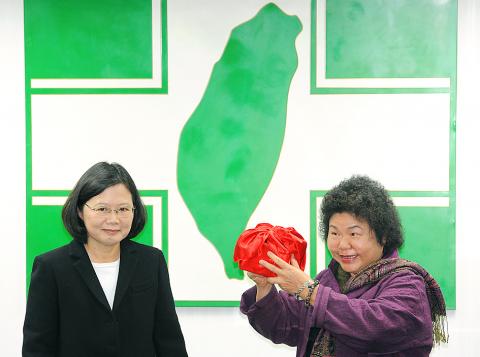Democratic Progressive Party (DPP) Chairperson Tsai Ing-wen (蔡英文) yesterday turned over the party chairpersonship to Kaohsiung Mayor Chen Chu (陳菊), who will serve as acting chairperson until a party election is held in May.
The handover ceremony was held after a Central Standing Committee meeting in Taipei yesterday afternoon.
Chen thanked Tsai for what she called her great contributions to the party and said the momentum Tsai had created toward party reform would not slow under her leadership.

Photo: Liu Hsin-de, Taipei Times
Chen said she would soon form a party affairs reform task force to discuss the party’s organization, direction, reform and policies.
People would be welcome to air their opinions at the discussions, and she hoped ideas voiced in them could be used as a reference for the next party leader.
“‘Why do people want the DPP to govern the country?’ and ‘What are the core values of a DPP government?’ — Those are key questions I and all party members should ask ourselves,” Chen said.
The ultimate goal for the DPP is not to win the 2016 presidential election or any other election, but to keep its commitment to establishing a better Taiwan, Chen said. Being in charge of the government is a means to fulfill that commitment, she said.
She also promised that the May election for the chairperson would be fair and transparent.
Meanwhile, Tsai said at the ceremony: “Being unable to lead the party back to power is my biggest regret.”
As to why the party was defeated in the recent presidential election, Tsai said: “I will give the party feedback, in the hope that the party can expand its social base.”
On her own role in the party’s future, she said: “I will not forget my commitment to Taiwan’s society and I will continue to contribute to this land.”
“I know people want to know where I am going. Actually my thinking is very simple. The reason I could reach this place was because people gave me a chance, and I would like to repay people through such things as public welfare activities,” Tsai said.
Tsai said she turned down an offer by the party to host a farewell event for her because she wanted to keep the day low-key.
A crowd of party officials and staffers lined up on both sides of the DPP headquarters’ entrance to see Tsai off with flowers and farewells.
Tsai submitted her resignation to the party after losing the presidential election on Jan. 14, but later agreed to remain at her post until yesterday, to give time for an acting chairperson to be found to lead the party until an election could be held.
Tsai will set up an office on Changan E Road in Taipei.
Last night, Tsai treated DPP staffers and members to a screening of The Lady, a movie about Burmese pro-democracy icon Aung San Suu Kyi.

Taipei has once again made it to the top 100 in Oxford Economics’ Global Cities Index 2025 report, moving up five places from last year to 60. The annual index, which was published last month, evaluated 1,000 of the most populated metropolises based on five indices — economics, human capital, quality of life, environment and governance. New York maintained its top spot this year, placing first in the economics index thanks to the strength of its vibrant financial industry and economic stability. Taipei ranked 263rd in economics, 44th in human capital, 15th in quality of life, 284th for environment and 75th in governance,

Greenpeace yesterday said that it is to appeal a decision last month by the Taipei High Administrative Court to dismiss its 2021 lawsuit against the Ministry of Economic Affairs over “loose” regulations governing major corporate electricity consumers. The climate-related lawsuit — the first of its kind in Taiwan — sought to require the government to enforce higher green energy thresholds on major corporations to reduce emissions in light of climate change and an uptick in extreme weather. The suit, filed by Greenpeace East Asia, the Environmental Jurists Association and four individual plaintiffs, was dismissed on May 8 following four years of litigation. The

A former officer in China’s People’s Liberation Army (PLA) who witnessed the aftermath of the 1989 Tiananmen Square massacre has warned that Taiwan could face a similar fate if China attempts to unify the country by force. Li Xiaoming (李曉明), who was deployed to Beijing as a junior officer during the crackdown, said Taiwanese people should study the massacre carefully, because it offers a glimpse of what Beijing is willing to do to suppress dissent. “What happened in Tiananmen Square could happen in Taiwan too,” Li told CNA in a May 22 interview, ahead of the massacre’s 36th anniversary. “If Taiwanese students or

The New Taipei City Government would assist relatives of those killed or injured in last month’s car-ramming incident in Sansia District (三峽) to secure compensation, Mayor Hou You-yi (侯友宜) said yesterday, two days after the driver died in a hospital. “The city government will do its best to help the relatives of the car crash incident seek compensation,” Hou said. The mayor also said that the city’s Legal Affairs, Education and Social Welfare departments have established a joint mechanism to “provide coordinated assistance” to victims and their families. Three people were killed and 12 injured when a car plowed into schoolchildren and their